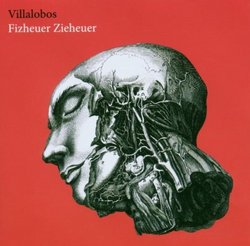Great stuff that drives my co-worker nuts
D. Dwyer | California | 08/09/2007
(4 out of 5 stars)
"If you know Ricardo Villalobos' stuff, then you have some idea of what you're getting here: very minimalist music, largely electronic sounding but with some analog elements peeking in, retreating, peeking in again. (In this case, it's a mournful brass band [P. Stout's comment below tells you the source].)
But where his previous full-length albums (Alachofa, Thé Au Harem D'Archimède) had or seemed to have movements within the context of a larger piece, this one is ALL "larger piece," really: one track, half an hour or so long (and then another mix of the same).
Sit with it and listen to it, and it's like someone DJ-ing a botany film: petals unfold, start to close, other petals open, start to close, close, others are opening, etc. It's the most subtle, sonic fireworks show you can get, next to D'Archimède, anyway. This one has a little harder texture but it's also more playful as all get out -- Villalobos is nothing if not witty.
I don't think this is the flat-out best thing he's ever done, but it may well be my favorite. My co-worker asked me not to play it anymore because, to him, the music doesn't go anywhere; something tells me he doesn't hear music in all-night highway driving, either."
4.5 Stars - Extremely minimal, but constantly engaging
Steward Willons | Illinois | 11/06/2008
(4 out of 5 stars)
"Ricardo Villalobos always impresses me. Just when you think you can safely attach him to a style (be it techno, microhouse, or whatever), he does something truly strange and reminds us that stylistic labels simply will not do. "Fizheuer Zieheuer" finds Villalobos working in long form, with two tracks clocking in an impressive 73 minutes. The title track is the centerpiece, while the second track is something like a re-composition based on the ideas and grooves of the former.
How does one approach a 35-minute techno work? The idea of melody is gone, as is any sense of small-scale structure. The changes happen so gradually that the listener is scarcely aware of them. The music puts you in that hypnotic techno trance so effectively that the duration is no longer an issue. The music doesn't "feel" long.
The first track features a looping brass figure, which, along with the beat, forms the basic of the track. From there, very few new elements are introduced. Villalobos gradually layers in some extra rhythmic elements and a trumpet periodically emerges, but overall, most of the development occurs with the use of delay. Villalobos creates interesting polyrhythmic grooves by using complex delay times.
I actually like the second track a little more because it is, in a sense, pure rhythm. There is no harmonic material, no melody, nothing but drums. It's as minimal as can be (think Plastikman's "Consumed"), but the rhythms are excellent. Again, Villalobos uses delay in such a way that we get layers of polyrhythmic material.
This album actually reminds me of Vladislav Delay and, in particular, his album "Anima" - a nearly hour-long work of experimental, slightly dubby, techno. Both artists work within the larger context of sophisticated electronic music, and both have proven that they have the compositional prowess to sustain interest through careful formal development. Is that where the comparison ends? You'll have to decide for yourself. The only thing I'll say is that both artists produce a similar sensation within me as I listen.
I can't really recommend this to a general audience. You really need to love minimal techno and experimental electronic music. I'm sure many will find this unbearably dull and that's okay - it's difficult listening, unless you like this sort of thing. For those who like Villalobos and this general style, "Fizheuer Zieheuer" is a unique and amazing album. Don't let the length deter you - the music is excellent and always engaging."

